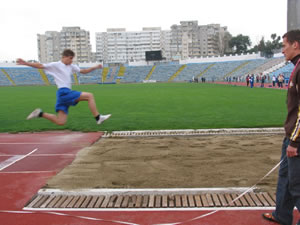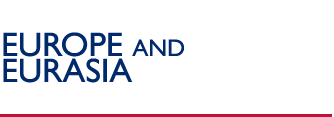Athletes Flock to Romania for 2005 Special Olympics Friendship Games
Special Olympics Romania played host to the 2005 Special Olympics Friendship Games from September 25-27 in the Black Sea resort city of Constanta. Over 500 athletes from nine European countries participated, showcasing the important role disabled people can and do play in today's society. The Opening Ceremony, praised by the representative of Special Olympics Europe and Eurasia as the best ever in Europe, included not only the athletes, coaches, organizers and volunteers, but 1000 local secondary and university students providing a much needed bridge between the disabled and non-disabled members of society. The competition itself was praised by coaches, family members and Special Olympics Europe and Eurasia as the best seen in Europe for several years. Over 500 medals were awarded as all athletes were recognized for their achievements at the Games. End Summary.
Hosting the 2005 Special Olympics Friendship Games was no small challenge for Special Olympics Romania, since it only started working in Romania in 2004 after receiving a $500,000 grant from USAID. Former Ambassador Crouch opened the first ever Special Olympics games in Romania just last September in Bucharest. In the true spirit of the games, local organizers set about putting on the best regional games ever for the 500+ athletes from nine European countries including: Bulgaria, Estonia, Hungary, Italy, Moldova, Russia, Serbia and Montenegro, Turkey, plus Romania.
The Opening Ceremony, organized by Special Olympics Romania, wowed the audience of 1,500 fans and 500 athletes. Attending dignitaries included Master of Ceremony Christian Topescu, Sports Commentator and Special Olympics Romania Board Member, Larisa Claru, MTV Romania presenter, and lively performances from favorite Romanian pop stars Monica Anghel, Nicola, and 3 Sud-Est. There were also performances by Romania's National Junior Gymnastic Team, a regional folk group, and a modern dance troupe. There wasn't a dry eye in the house when Romanian Special Olympics Athlete Ioana Ciobanu recited the Athlete's Oath. All performances, the sports hall facilities, and labor involved with the Opening Ceremony were donated to support Special Olympics. Romanian Television broadcast the Ceremony live in Constanta and will air parts of the Ceremony in Bucharest at a later date.
Christo Vlekov, the Representative of Special Olympics Europe and Eurasia, stated that this Opening Ceremony was the best ever held in Europe. It provided an opportunity to raise the profile of Special Olympics Romania and the Friendship Games, and to promote the values demonstrated by Special Olympics that all individuals can make a valuable contribution to their society and that true democracy means inclusion of all. US Embassy volunteers heard many in the audience admire the courage and abilities of the Special Olympic athletes.
The Games followed with competition in track and field, bocce, football, table tennis, and gymnastics. Organized by Special Olympics Romania, volunteers were the key to the Games' success and provided venue set-up, timing, measurement, recording, tracking, press relations, photography and a whole host of other assistance. These volunteers were university students, members of the local community, Peace Corps Volunteers, and US Embassy/Bucharest staff.
Despite the recent flooding around the country and in particular the Constanta area during the week before the event, all but three Romanian athletes showed up for the Games. This demonstrates, as mentioned by Special Olympics Romania Foundation Director Cristian Ispas, the value the athletes and their families place on the opportunities provided by Special Olympics.
By the end of the Games, Special Olympics distributed over 500 medals. All athletes were recognized in one way or another for their achievements. They returned to their countries and their communities with a renewed desire to prove their abilities.
During the track and field awards ceremonies, a Special Olympics Europe and Eurasia official said that the quality of the games was a 'really high level,' and one of the best he'd seen in a number of years.
One of the participating Heads of Foreign Delegations commented: "I have been bringing our athletes to international games for over eleven years, and this event was one of the best I have ever seen. The Romanians really made us feel welcome. Everything was perfect."
Testifying once again to the importance Special Olympics plays in people's lives, the mother of a Romanian athlete said, "Our entire family is so much improved thanks to Special Olympics and the funding that the US provided. All our lives were influenced by having our son.
But since he began attending Special Olympics events like this one, he has gained so much self-confidence. He is changed and we are all thrilled to see him developing so well. Thank you!"
Reducing discrimination against persons with disabilities has been a fundamental goal of US Embassy/Bucharest. We have been very pleased with the broad results achieved in a short time by this $500,000 three year USAID grant. Just one year after holding their first national games, Special Olympics Romania has active programs in all 41 Judets (counties) and has successfully sponsored these regional games. The head of Special Olympics Romania, Cristian Ispas, is a former Fulbright scholar. The Special Olympics Romania Foundation (SORF) program targets children and adults with learning disabilities who live in natural or foster families, group homes, or institutions, focusing on their integration into mainstream society.
By working with children with disabilities and their families, the program is also directly assisting to keep families together, rather than the former communist model of locking up people with disabilities in large state run institutions. By the end of 2006, SORF will have engaged 15,000 athletes, along with thousands of volunteers (both students and professionals) and family members in its activities. Specific program components (sports events, family support networks, athletes' leadership, etc.) will be implemented at different stages in all Romanian counties. SORF works in close collaboration with NGOs and public institutions working with children and adults with intellectual disabilities throughout the country. SORF is an independent organization, accredited by Special Olympics International.
 |
 |
| Special Olympics Romania receives a “thumbs up” from athletes |
Athletes traveled from nine countries to compete in a variety of events |
 |
 |
| Athletes traveled from nine countries to compete in a variety of events |
Athletes traveled from nine countries to compete in a variety of events |
Back to Top ^
|


